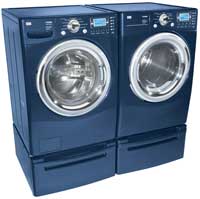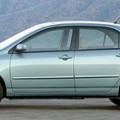If you are shopping for a quality washer and dryer, there are several things that you must consider. After you buy the appliances, make sure not to let their maintenance slip by the wayside.
There are plenty of home maintenance tips out there to help on this front, and you should also think about purchasing a home warranty protect your investments. We have enough of a emergency fund saved up that a home warranty plan is not for us, but it very well may fit your needs.
Washing And Drying Shopping Considerations:
Basic Washing Needs
Consider your weekly washing habits carefully. There are units that can wash items effectively after the wash cycle begins and units that keep clothes fresh for hours after a cycle ends. Because today’s washers are so advanced, you can find a variety of features that suit your specific needs.
Washing Machine Cleaning Challenges
If your clothes require special care, purchase a unit that has a delicates cycle. To eliminate allergens and stains, consider a machine that has a steam feature.
Washer and Dryer Efficiency
Many washers and dryers that are sold in stores today are ENERGY STAR qualified. However, you should still visit the Consortium of Energy Efficiency’s website to check each unit’s performance. On the website, there are tiers for each unit’s water factor and modified energy factor.
Washer and Dryer Sound Considerations
If you plan to install your appliances near a sleeping or living area, you should ask a sale representative about sound dampening. The appliances will produce less noise if they have good suspension and plenty of insulation.
Electric And Gas Dryers
Although electric dryers and gas dyers are popular, the selection process is difficult for some consumers because they don’t know which machine provides the best performance. On average, an electric dyer and a gas dryer produces the same energy levels. The costs, however, are not the same. A gas dryer typically costs $40-60 more than an electric unit. Though, it costs far less to operate a gas dryer throughout the year because electric units use much more energy.
Dryer Installation Considerations
If you need a standard dryer, you must use an exhaust vent so that moisture and heat can escape from your home. To increase the dryer’s performance, keep the ductwork below 60 feet. Also, the ductwork should have minimal turns; if it is not installed properly, the drying times will increase because the unit will not exhaust correctly. This means higher monthly bills!
If you live in an apartment, townhouse, or condo, running the venting outside will be impossible. In these situations, a condensation dryer must be used. This type of dyer doesn’t need exterior venting since moisture and heat travels through a chamber.
How To Maintain Your Washer And Dryer
Before and after each load, remove all dryer lint to increase efficiency. Then, dry the gaskets and the washer door to improve air circulation. If the surfaces remain moist, mold growth will occur. We leave our washer door open when not in use. Otherwise, a really rank smell will develop! Always inspect the unit before you start a drying cycle. The machine’s footing should be firm and level.
Read the owner’s manual to ensure that the proper amount of detergent is used. If you use pre-measured pods incorrectly, you could damage your washing machine. At the end of each month, examine the dryer duct work thoroughly; there should be no unnecessary bends, blockages, or crimps. Then, inspect the washer hoses for leaks or creaks. If a hose bursts, it will spill several gallons of water every hour. To prevent flooding, replace your hoses once every few years.
Every three months, clean the lint filter with a detergent to eliminate chemical residues! Although chemical residues are invisible, they often restrict airflow. This can cause a fire hazard if not addressed! At the end of every year, remove the entire exhaust duct line and clean it. This is an important task because clogged ducts cause numerous house fires each year.
Your Complete Washer And Dryer Buying And Maintenance Guide – Bonus Tips
- Always use metal duct work because it lowers fire risks.
- If your dryer has scratches, cover them with a coat of paint to prevent rusting.









